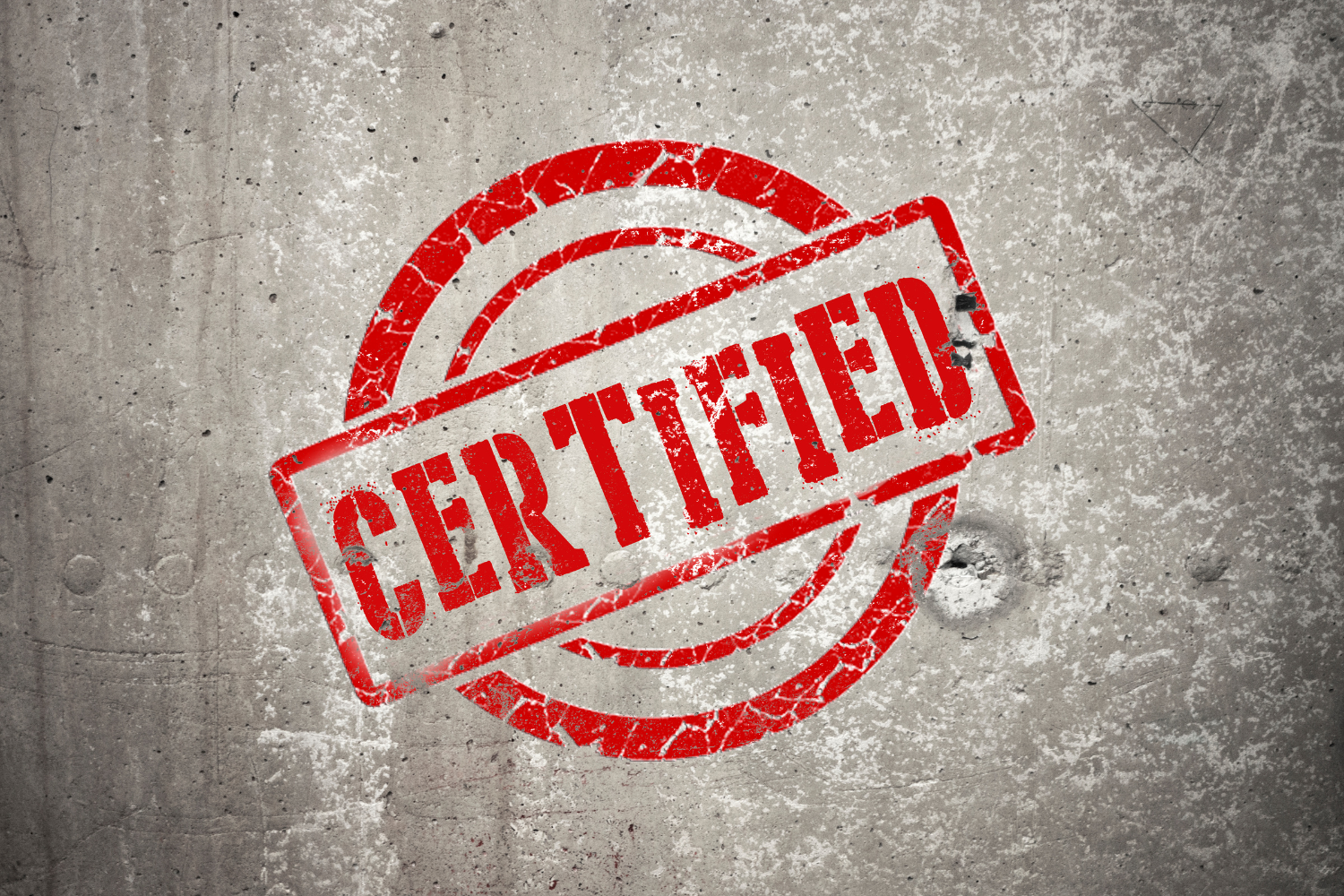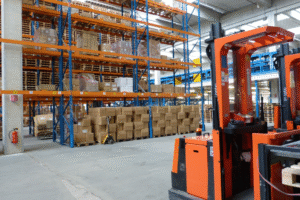NSF certification is a third-party certification that verifies products, services, and facilities meet strict public health and safety standards set by NSF International. For businesses, particularly food equipment manufacturers, food processors, and companies in the food supply chain, achieving NSF certification verifies that products meet NSF International’s safety and sanitation standards, helping businesses align with regulatory expectations, building consumer trust, and protecting public health.
This certification process simplifies quality assurance by confirming that products are tested, accredited, and meet industry standards for safety and sanitation. In this article, we provide a straightforward, step-by-step guide on how to get NSF certification, helping businesses understand the process, reduce food safety violations, and achieve NSF-certified status for their products or production facilities.
Table of Contents
ToggleWhat Is NSF Certification?
NSF certification is a third-party certification program that ensures products, equipment, and facilities meet strict safety, quality, and sanitation standards established by NSF International. This certification process verifies that products are tested, accredited, and comply with industry requirements to protect public health. Businesses across various sectors pursue NSF certification to demonstrate their commitment to safety and quality assurance.
Industries that commonly seek NSF certification include:
- Food and beverage
- Dietary supplements and sports supplements
- Water treatment systems
- Commercial food equipment and food processors

Why Should Your Business Get NSF Certified?
NSF certification demonstrates that your products and services comply with safety and sanitation standards while building consumer confidence. It also helps businesses meet regulatory requirements and gain a competitive edge.
Build Consumer Trust and Confidence
The NSF mark assures consumers that your products have been independently tested to meet strict safety and quality standards. For food processors, commercial food equipment manufacturers, and businesses in the food supply chain, NSF certification verifies that equipment and products are designed with hygienic equipment design and quality assurance in mind.
Displaying the NSF mark on certified products or production facilities demonstrates transparency and a commitment to protecting public health, helping businesses build trust and long-term customer loyalty.

Meet Industry and Regulatory Standards
NSF certification helps businesses align with industry and global safety standards, including those recognized by regulatory bodies like the FDA and WHO. The certification ensures products and equipment meet NSF International’s recognized safety, sanitation, and quality standards.
This is particularly important for food equipment manufacturers and other businesses that must align with regulatory bodies to avoid food safety violations and service compliance issues. Meeting these standards also makes it easier to operate in international markets.

Gain a Competitive Edge
In today’s crowded marketplace, NSF certification sets businesses apart by offering independent, third-party verification of product safety and quality. Being NSF-certified for food equipment manufacturers, commercial kitchens, and production facilities highlights a commitment to high-quality food equipment and sanitation. Certified products are trusted by public health officials, regulatory bodies, and consumers, giving businesses a clear advantage when competing with uncertified companies in the industry.
How to Get NSF Certification: Step-by-Step Process
Securing NSF certification involves a structured process to ensure your products meet safety and quality standards. From selecting the proper NSF standard to maintaining ongoing compliance, following these steps can simplify the certification process for your business.
Step 1: Determine the Relevant NSF Standard
The first step in the NSF certification process is identifying which NSF standard applies to your product. Use NSF International’s resources or contact their experts for guidance on selecting the correct standard based on your industry.
Common NSF standards include:
- NSF/ANSI 173: Dietary supplements
- NSF/ANSI 61: Water treatment systems
- NSF/ANSI 51: Commercial food equipment
Step 2: Submit Your Application
Contact NSF International to begin the certification process and complete the required application form. Include detailed information about your product, such as materials, components, and specifications. This ensures that the application covers all aspects of the NSF certification process.
An application fee must also be submitted, and the cost depends on the type and complexity of the product. Once your application is processed, NSF provides specific fee details.
Step 3: Product Testing and Evaluation
NSF performs rigorous laboratory testing to verify that your product meets all applicable safety and quality standards. This testing is a critical part of the certification process.
What to expect during testing:
- Verification of ingredients or materials
- Contaminant checks (e.g., heavy metals, bacteria)
- Performance and durability testing
Step 4: On-Site Facility Audit
NSF auditors visit your manufacturing facility to verify compliance with NSF safety and sanitation standards. This inspection ensures that your production facility meets NSF standards and supports public health efforts by verifying that products meet recognized safety and sanitation standards.
Key areas evaluated during the audit include:
- Hygiene and cleanliness standards
- Manufacturing processes and quality control practices

Step 5: Certification Approval
NSF grants certification approval once your product passes testing and on-site audit. Certified products are listed on the NSF Certified Product database, giving businesses visibility and credibility in the market.
Your company will also receive the NSF mark, which can be displayed on product labels, packaging, or marketing materials to highlight your certification status.
Step 6: Maintain Ongoing Compliance
NSF certification isn’t a one-time process. Regular audits and product retesting are required to ensure continued compliance with NSF standards.
Tips for maintaining your certification:
- Monitor quality control closely to avoid food safety violations.
- Stay informed about changes to NSF standards and certification criteria.
- Address sanitation issues or corrective actions promptly to avoid certification lapses.
How Much Does NSF Certification Cost?
NSF certification costs vary based on several factors, including product type and testing requirements. Understanding these costs helps businesses budget effectively for the certification process.
Several factors influence the cost of NSF certification, including the complexity of the product, testing requirements, and the extent of facility inspections. Products with intricate designs or multiple components, such as dietary supplements or high-quality food equipment, often require more thorough testing.
For food equipment manufacturers and production facilities, additional sanitation evaluations and audits to ensure compliance with NSF standards may increase costs. Certification fees also vary by industry, with food processors and companies in the food supply chain often incurring higher costs to meet strict regulatory requirements from agencies like the FDA and ANSI.
General Cost Ranges
The cost of obtaining and maintaining NSF certification typically includes several components:
- Application fees: These start at approximately $1,500 and may increase depending on the product type and category.
- Testing fees: Depending on the complexity of the product, testing can range from $3,000 to $5,000. Testing for contaminants, material durability, or sanitation issues may raise costs further.
- Ongoing compliance fees: Annual fees for plant inspections and recertification audits range from $1,000 to $2,000. These ensure that certified products remain compliant with NSF certification criteria.
Tips for Budgeting for NSF Certification
Businesses should consider both initial and long-term costs when budgeting effectively for NSF certification. Proper planning can help manage expenses while maintaining compliance.
- Evaluate your product’s complexity to estimate testing costs, including laboratory evaluations for contaminants or material safety.
- Allocate funds for ongoing compliance fees, including annual plant inspections and periodic product retesting.
- Set aside resources for corrective actions, such as revising production processes or addressing sanitation issues identified during audits.
- Explore grants, subsidies, or industry-specific incentives that may help offset certification fees, particularly for small businesses.
- Plan for internal training to ensure staff understand the requirements for maintaining NSF certification and quality assurance.

How Long Does It Take to Get NSF Certified?
The timeline for obtaining NSF certification depends on product complexity, testing requirements, and facility readiness. While the process can vary, businesses should plan to complete the certification in several weeks to a few months.
Typical timelines for NSF certification:
- Application submission: 1-2 weeks
- Product testing: 4-12 weeks, depending on product complexity
- On-site audits: Varies based on scheduling and completion timelines
- Potential delays: Issues like testing failures or incomplete documentation can extend the process

What Happens If a Product Fails NSF Testing?
Products can fail NSF certification testing due to safety concerns, inaccurate claims, or non-compliance with standards. Common reasons for failure include contaminants in materials or ingredients, mislabeling, or discrepancies in quality control. Businesses can take steps to resolve these issues and reapply for certification.
Steps to fix issues and reapply:
- Address contaminants or non-compliant materials identified during testing
- Correct labeling discrepancies or inaccurate product details
- Implement corrective actions in production processes
- Resubmit products for testing and evaluation

Why NSF Certification Is Key to Business Success
NSF certification is critical in ensuring safety, quality, and public trust for businesses in industries like food, supplements, and equipment manufacturing. Following the step-by-step process outlined in this guide, companies can achieve certification and demonstrate their commitment to protecting public health. Start the NSF certification process today to enhance credibility, comply with industry standards, and gain a competitive edge in your market.
Frequently Asked Questions
How Do I Know If My Product Needs NSF Certification?
Products like dietary supplements, food equipment, and water treatment systems often require NSF certification for credibility.
Can Small Businesses Afford NSF Certification?
Small businesses can manage costs by choosing affordable testing packages and budgeting for ongoing compliance fees.
How Do I Find an NSF Representative to Help Me?
Contact NSF International directly or use their website to connect with regional representatives.
Can I Use the NSF Mark Immediately After Approval?
Yes, once certified, you can display the NSF logo on packaging and marketing materials.
What Is the Difference Between NSF Certification and FDA Approval?
NSF certification verifies product safety and sanitation through independent testing, while FDA approval focuses on regulatory compliance and labeling for specific product categories.
References
- Centers for Disease Control and Prevention. (2024). Water, Sanitation, and Environmentally Related Hygiene (WASH). https://www.cdc.gov/hygiene/about/index.html
- National Sanitation Foundation International. (n.d.). Food Equipment Standards. https://www.nsf.org/nsf-standards/standards-portfolio/food-equipment-standards
- National Sanitation Foundation International. (2024). The Importance of NSF/ANSI 173 Certification for Dietary Supplement Products. https://www.nsf.org/knowledge-library/importance-nsf-ansi-173-certification-dietary-supplement-products
- U.S. Food and Drug Administration. (2024). Advancing Regulatory Science. https://www.fda.gov/science-research/science-and-research-special-topics/advancing-regulatory-science
- World Health Organization. (2024). Food safety. https://www.who.int/health-topics/food-safety




